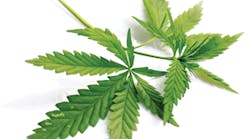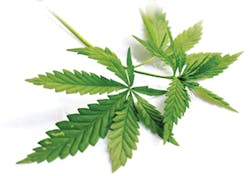Colorado's efforts to ease regulations against the drug lead to a different type of discussion with dental patients who use it.
by Suzanne Hubbard, RDHThe headlines were splashed across all national media. Governor John Hickenlooper signed an executive order that makes an "official declaration of the vote" related to Amendment 64. That declaration formalizes the amendment as part of the state constitution, and makes legal the personal use, possession, and limited home-growing of marijuana under Colorado law for adults 21 years of age and older.
It was no surprise to me to see this declaration come about. Every election year marijuana legalization is placed on the ballot in Colorado for consideration, and every year it has been vetoed, except in 2012. What has also not been a surprise is to see just how many marijuana users sit in my dental chair each day, regardless of legislation. Some use it for personal reasons and some for medical reasons. However, with legislation looming and task forces being assigned to this delicate matter, it's time we as dental hygienists confidently tackle marijuana use head-on.
-----------------------------------------------------------
Consider reading these articles too
Diversion And Addiction among dental professionals
Surviving bullying in the workplace
THE HYGIENIST'S ROLE IN INTEGRATIVE MEDICINE
-----------------------------------------------------------
Even though legislation is opening the door for legalization, let's face it -- people have been growing, using, selling, and distributing marijuana for years. It's interesting to note culturally how marijuana has changed over the decades. We've gone from taboo to table. Literally we have gone from not talking about it to having it right on the table! We may need to tweak our perspectives just a bit to understand the totality of marijuana use. Take, for instance, how it affects us as dental hygienists.
To say the least, it is a delicate matter to approach patients with "Are you a marijuana user?" It can open up a can of worms. Unfortunately, on global medical/dental history forms, the question is posed as "Are you a substance user?" Because marijuana is the new cigarette, most don't identify marijuana as a substance. Some identify it as their happy pill, prescription, or cigarette of choice. Trying to navigate through the cannabis forest can be difficult.
Take, for instance, my patient "Joel." Joel is a 19-year-old snowboarder who lives in the mountains of Colorado. He came in for his six-month recall with a clean medical record. On intraoral inspection, I noticed green stain along the lingual margins of his teeth, and heavy staining on the surface enamel pits of No. 14. I took an intraoral photo of No. 14, sat Joel upright in his chair, and showed him the picture. We discussed marijuana use.
"I've never used marijuana!" He was adamant. So I approached it by telling him that if he were a user, what he could expect. Our conversation centered on how he could take care of his teeth and mouth. Slowly Joel realized he could trust me, and he opened up and finally told me that he was a user. Comforting him, I made sure he knew that I was not an undercover cop ready to slap handcuffs on him, but as an oral health specialist I was here to provide oral help and suggestions.
"John," on the other hand, circled substance use on his medical record and wrote marijuana (due to a car accident). John is a well-educated, highly successful man in his early 50s, who sees me for routine visits every six months, and we discuss his marijuana use openly. Green stain coats his teeth, sheet calculus builds on the lingual margins, and his gum tissues have lost their stippling, becoming fibrotic. Fortunately, since John and I talk about his marijuana use, I can give him instructions for care. We talk about swishing with bicarbonate rinses, the use of a rubber tip stimulator for gingival plaque retention and the sheet calculus, and electric toothbrushing. We discuss his diet and nutrition, and we even broach the subject on cessation and the harmful side effects of marijuana. Thankfully, he is open to oral hygiene instruction.
I'll never forget the first time I asked a patient if he was a marijuana user. I was shy, I lowered my voice, and in a nervous whisper I asked the young man, "Do you smoke pot?" Oh, good grief, I thought, I should've said marijuana, not pot! But I think this lingo made the difference, and he popped right up and said, "Of course I do! You don't think I'd come to the dentist's office not having something in me to control my anxiety!" We have to remember that sometimes patients will present higher than a kite just to cope with the anxiety of coming to see us! Irony.
Overall, we need to educate ourselves about the changing environment. Marijuana is the new cigarette, the pill of choice, the magical herb, or the prescription needed. Whatever the reason, the cause, or the cure, we need to be able to have an open dialogue with our patients. Some visit us while they're trying to quit, and we may be just the mentor or frontrunner in a person's goal toward well-being that they need. RDH
Straight talk for your patients
In order to talk to patients about marijuana, we really need to be educated about it.
- The first thing we need to do is understand that there are no stereotypes. Marijuana crosses all cultures, ages, genders, and socioeconomics. It is not a poor man's drug or a rich man's drug, and to most it isn't even a drug.
- We also need to look at changing the way our medical/dental forms read. We need to change our lingo to fit what is culturally acceptable, and what will bring about open conversation with our patients. Open dialogue helps to further our oral goals with patients. Why not put marijuana use on the medical/dental form?
- We need to be comfortable sharing with our patients. I remember asking a patient if she used marijuana and she said, "No, I drink green tea!" She squirmed in her chair, and I could tell she was uncomfortable. Picking up on her body language, I realized this was not a comfortable subject to talk about. She could have been hiding her usage of marijuana. But it was not my intention to call her out on it, nor was it my judgment. I simply placed the question before her. We are oral health inspectors; and it's part of our job to educate our patients even though the subject might be difficult to discuss.
- Some need compassion. Those who use marijuana to waylay the side effects of cancer, MS, fibromyalgia, and a host of other painful diseases just need support. This becomes a risk-benefit scenario, where the patient wants comfort, not a list of dos and dont's.
- However, on the flipside of compassion, we need to know that marijuana harms the oral cavity. There is a lot of debate on this one. Do your homework! One study suggests frequent use of marijuana may triple the risk of severe gum disease. Tobacco is already known to raise the risk of periodontal disease. Researchers in New Zealand wanted to know if marijuana had a similar effect. Their study included 903 people. Some had smoked marijuana an average of once a week for 15 years. They were three times as likely to have severe gum disease as nonsmokers of marijuana. Reuters Health News service reported on the study on February 5, 2008. It was published in the Journal of the American Medical Association.1
- Marijuana's harmful effects on the mouth include the risk of mouth cancer. "Drug Abuse" reports that marijuana has been found to have a higher concentration of cancer-producing ingredients than cigarettes. Pot smokers typically hold the smoke in the lungs and mouth for longer periods of time, increasing the effects on the mucous lining in the mouth and exposure to the cancer-causing agents. The tar found in marijuana has developed tumors on the skin of animals in laboratory tests.
- A report by the American Medical Student Association says that marijuana users tend to get sick more frequently than those who don't smoke it. In addition to the lowered immune system and chemical poisons produced by the THC that linger in the mouth, marijuana users undergo personality changes that lead to poor hygiene. They lack energy and lose interest in everyday activities that were once important, such as brushing, flossing, and rinsing. The smoke from marijuana causes bad breath, and the lack of mouth care eventually produces additional problems for teeth and gums.
- Marijuana can lead to higher incidences of caries, and it can cause cotton-mouth or xerostomia. Because of marijuana's side effects of dry mouth and hunger, most people turn to soft drinks and carbohydrates to stave off these side effects. This leads to plaque retention and a higher incidence of caries.
Suzanne Hubbard, RDH, works for a private practice in Longmont, Colo.
Past RDH Issues







